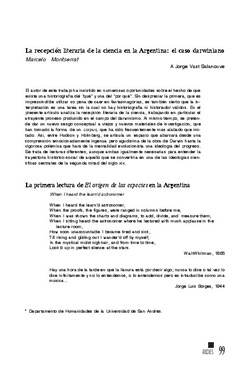La recepción literaria de la ciencia en la Argentina: el caso darwiniano
The literacy reception of science in Argentina

Ver/
Fecha
1995-04Autor
Monserrat, MarceloResumen
El autor de este trabajo ha insistido en numerosas oportunidades sobre el hecho de que existe una historiografía del "qué" y una del "por qué". Sin despreciar la primera, que es imprescindible utilizar so pena de caer en fantasmagorías, es también cierto que la interpretación es una tarea sin la cual no hay historiografía ni historiador válidos. En el presente artículo analiza la recepción literaria de la ciencia, trabajando en particular el atrayente proceso producido en el campo del darwinismo. Al mismo tiempo, se pretende dar un nuevo sesgo conceptual a viejos y nuevos materiales de investigación, que han tomado la forma de un corpus, que ha sido frecuentemente más alabado que imitado. Así, entre Hudson y Holmberg, se articula un espacio que abarcará desde una comprensión emocionadamente ingenua pero agudísima de la obra de Darwin hasta la vigorosa polémica que hará de la mentalidad evolucionista una ideología del progreso. Se trata de lecturas diferentes, aunque ambas igualmente necesarias para entender la trayectoria histórlco-social de aquello que se convertiría en una de las ideologías científicas centrales de la segunda mitad del siglo XIX. Many a time the author has stressed the fact that there is a historiography applied to "what" and another one applied to "why". Without disregarding the former, which it is absolutely necessary to use so as not to fall into optical illusions, it is also true that without the task of interpretation there can be no valid historiography or historian. The author examines the literary reception of science, particularly the appealing process produced in the field of Darwinism. At the same time, he tries to give a new conceptual course to oíd and new research subjects, which have taken the shape of a corpus, more frequently praised than imitated. Thus, between Hudson and Holmberg, a space is enunciated where the reader will find from an excitingly naive but most acute understanding of Darwinís work to the healthy controversy which will make an ¡deology of progress out of the evolutionist mentality. They are different interpretations, though both equally necessary in order to understand the historie and social course of what was to become one of the main scientific ideologies in the second half of the nineteenth century.
